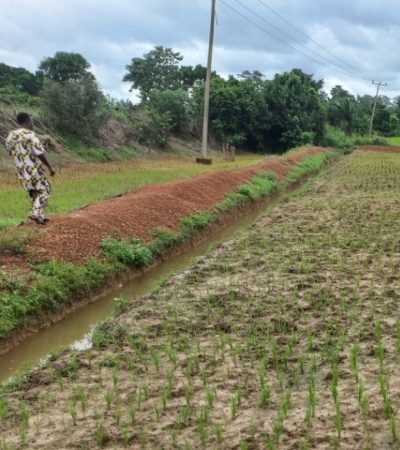Mamadou Coulibaly is one of thousands of rice farmers in Senegal whom Feed the Future is assisting to increase rice production, improving both their food security and household incomes. Under Feed the Future, USAID is working with grassroots NGOs and producer cooperatives on an economic growth project that aims to bring a high-yielding new rice variety up to scale across the country.
Rice is a staple food in Senegal; yet, in the south, irrigation for lowland rice is available in very few areas. Historically, traditional rain-fed rice varieties and poor seed stock have resulted in meager yields of about one ton per hectare, which means farmers couldn’t grow enough to meet their family’s needs, let alone enough to generate income.
In response to this challenge, Feed the Future launched a project introducing to farmers a high-yielding, rain-fed rice variety developed by the research organization AfricaRice. The pilot program in 2010 enabled 112 Senegalese farmers to produce 104 tons of rice and sell 29 tons, resulting in earnings of about $12,000 collectively.
The success of the pilot program set the stage for working with many more farmers. Last season, the project supported almost 4,000 producers to introduce the high-yielding rice variety in their communities and trained them on best practices for cultivation. By developing a Senegalese network of certified seed growers for the high-yielding rice variety, Feed the Future is ensuring the production of certified seeds for future growing seasons and scaling up the project’s impact.
For families who used to have to buy rice in order to eat it, being able to both grow their own rice and sell the surplus crops and seeds is a tremendous improvement. The new rice variety supplements their diets and generates additional income for other household needs. Mamadou Coulibaly says he uses the income from the sale of new seeds to buy other kinds of food and pay for medicine and schoolbooks for his children.
“I stopped cultivating rice several years ago because it just didn’t grow well,” Coulibaly says. “When I learned about [the new seed variety], I took up rice production again. Last year, I sold my rice seeds for more than one million francs [$2,000] and used my earnings to finish building my house and to buy a motorized plough and some cattle.”
USAID/Senegal Mission Director Henderson Patrick said the rice program is a central component of the Feed the Future strategy in the country. “Our greatest satisfaction comes from seeing up close the difference we’re making for farming households across the south of Senegal,” Patrick said. “We are looking forward to seeing the program grow and to position those farmers to sell a surplus rice crop to nearby towns and cities.”
UPDATE: The success of New Rice for Africa, or NERICA, has evolved quite a bit in 2012 since we told the story of Mamadou Coulibaly’s re-entry into rice cultivation after he had all but given up on farming. The original 114 farmers involved with Coulibaly in the program that began in 2010 have grown to a group of nearly 5,000 producers this year.
Under Feed the Future, USAID has invested incost-sharing to rapidly replicate the new seed base at a large scale. Now, more than 200 tons of NERICA seeds are available to farmers, minimizing the “rice deficit” that previously obliged farmers to commercially purchase enough rice to feed their families up to half the year. Many of these farmers now have a surplus to sell. They are not only earning money from their product, they are saving the cash they were previously spending on commercial rice.
Looking ahead, Feed the Future will make additional rain-fed rice varieties available to non-irrigated lowland areas, which are primarily cultivated by women. The program’s focus is shifting towards access to financing, investment in small equipment for mechanization and ultimately improved storage.
Read more about Mamadou Coulibaly in the May/June 2013 edition of USAID FrontLines.


